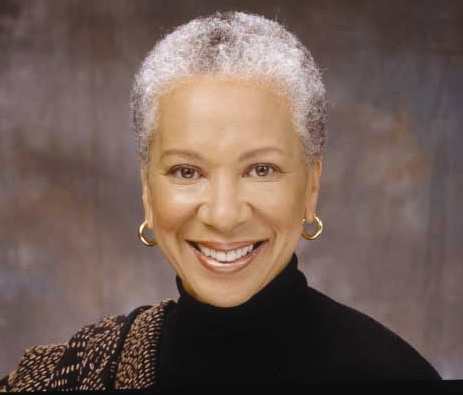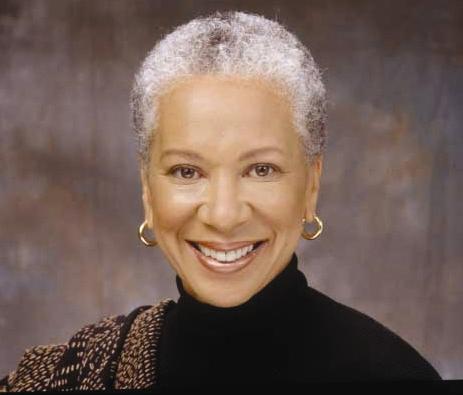 “This issue is too important to be left to transportation professionals,” says Angela Glover Blackwell.
“This issue is too important to be left to transportation professionals,” says Angela Glover Blackwell.
Angela Glover Blackwell would like to remind you that transportation is a civil rights issue.
Blackwell is the founder and chief executive officer of PolicyLink, “a national research and action institute advancing economic and social equity.” Their slogan is “Lifting Up What Works.” They believe that the people at the grassroots, closest to the nation’s problems, should be a central part of figuring out solutions.
Transportation has emerged as a signature issue for PolicyLink. The group now chairs the newly formed Equity Caucus, part of Transportation for America, calling on federal policymakers to see equity and social justice as a key part of transportation planning.
Blackwell recently was invited to the White House, along with many governors, mayors, and other elected officials, to give her perspective on President Obama’s proposed $50 billion infrastructure plan. She was the only public policy advocate to attend.
She talked to us by phone about how she was able to influence the discussion that day, about how public transit cuts are devastating to low-income Americans, and about the central role that transportation policy has always played in the struggle for civil rights.
Q. How was it that you came to be invited to sit at that table with the president?
A. I was thrilled to be invited to the table, and I’m quite sure that the reason that I was invited is because just the week before, PolicyLink and Transportation for America launched the Equity Caucus [see their principles here].
[At] that launch that nearly 200 people attended in the Cannon Office Building, Congressman Elijah Cummings (D-Md.) talked about transportation in a way that just made it so real. There were people there who had tears in their eyes, I understand, from listening to him talk about what transportation means to elderly people trying to get around, to mothers trying to earn a living.
I think that [we were invited because of] our focus on people, our focus on equity, our focus on public transportation, and our determination that this issue is too important to be left to transportation professionals.
Q. So there you were. Tell me what you were able to contribute.
A. You probably saw the list of who attended. There were governors, mayors, transportation secretaries past and present, labor leaders. When the president came in, after greeting people and saying a couple of opening remarks, he said, “We’re going to start off this conversation hearing from Gov. [Ed] Rendell [D-Penn.] and from Angela.” So I was just so pleased to see the equity perspective frame the conversation right at the top.
After my remarks, several people referred back to them. In particular, they picked up on the people focus. I think that those people who care about transportation have recognized that it is too often an insular conversation, and the people who are impacted most by the decisions aren’t engaged at all.
Q. You talk about creating an awareness that there are people who are constituents for public transportation. Do you see that increasing at the grassroots level?
A. I am definitely seeing more engagement. We’re seeing real concern in Chicago, in St. Louis, about the cutbacks in public transportation, what that means for people.
The Transportation Equity Network is organizing all over to make sure that grassroots people in communities — who are concerned about their livelihoods and their futures, and how little they’re able to get out of their monthly incomes — they’re really getting involved. I think we’re beginning to see the beginning of a movement stirring all across the country of people making their voices heard on this issue.
Q. Could you talk about the importance of public transportation to people with lower incomes, working-class people? And how that figures into the larger economic picture?
A. Yes. There are a couple of things I want to point out in that regard. One is that the bottom fifth of the nation, the poorest fifth of Americans, spend 42 percent of their annual household budget on an automobile budget, more than twice the national average. So for people who are poor, owning an automobile is a burdensome thing.
Nearly 25 percent of African-Americans do not have access to a car, compared that with 7 percent of non-Hispanic whites. You have nearly the same number of Latinos who do not have access to a car. So this is huge, this is not an isolated problem. For people who are spending too much of their income — over 40 percent just to own a car — clearly this has a devastating impact on the economy in terms of all of the things that people cannot do and cannot participate in.
For people who don’t have access to cars and depend on public transportation, the current crisis is devastating. More than 110 cities have public transit routes that are at risk. Children can’t get to school; people can’t get to work. 80 percent of the nation’s systems are either considering or have recently enacted fare increases or service cuts.
But here’s something else that Americans need to know. Spending on transit generates more jobs than spending on highways. If our nation’s 20 metro areas shifted just 50 percent of their highways funds to transit, they would create over 1.1 million new transit-related jobs in over 5 years. That’s without spending a single dollar more.
Q. It strikes me that something strange has happened in this country, that now when people talk about public transit, we get a polarized political situation where people sometimes say, “Cars are what ordinary folks use. Investing in public transit, that’s what this urban, sophisticated elite wants.”
A. I have heard that. Part of the reason is because there are two things going on in this country at the same time. One is that we have continuing, entrenched urban poverty, with the communities that have always been left behind continuing to be left behind.
At the same time that we have that continuing harsh reality, we have many enlightened people living in metropolitan areas who recognize that for the sake of climate, we need to get out of our cars and use more public transportation, we need to live in denser communities, we need to connect in communities that are diverse and enjoy the cultural activities that reflect this nation. These people are often moving into cities — Chicago, Washington, D.C., San Francisco, Manhattan in New York — and enjoying the fruits of urban life, looking for safe, efficient public transit, and wanting to live near transit stops so that they can be more efficient in the use of their income.
Often this is what people see as gentrification, and people in poor communities often fear that if a community starts to gentrify, t
hey may be pushed out of the communities.
What we have to remember is that the majority of people who use public transportation in this nation are people of color, low-income people. That is what keeps our system going. If we are going to begin to invest in it, we need to invest in it leading with equity, asking, How do we build modern public transportation systems that serve those people who have been the backbone of utilizing public transportation? Who need it, not because it’s the smart thing to do, but it’s the only thing for them to do in order to stretch their dollars and respond to their reality of not having a car? This notion that public transit is [only] for the affluent who are looking for a different lifestyle is a false notion.
Q. I’ve heard you refer to access to transportation as a civil rights issue. I would like to hear you speak to that.
A. It is interesting that transportation, in recent years, has not been framed as a civil rights issue, because most of the civil rights struggle in this country has centered around transportation, in one way or another, starting with Plessy v. Ferguson [in 1896]. That had to do with access to train cars. Then we have Rosa Parks sitting down on a bus. We had the Freedom Riders trying to do something to show that black people ought to be able to ride a bus across jurisdictions, they ought to be able to ride through the South on a bus without having to go to the back of the bus. The whole urban renewal, which people often call “black removal,” because that’s what happens, in the 60s, was a fight around highways coming in, going right through communities that had been vibrant, often destroying the financial district in an African-American community.
So if you go all the way from Plessy v. Ferguson right up to the urban renewal, you will see that the fights have often been around transportation, and how transportation decisions have been made. Also the interstate highway system, the roads that have been built that allowed for the expansion from cities into suburbs, often had a devastating impact, as people abandoned city schools, and moved to suburban schools, leaving poor people of color in city schools, with fewer resources, less political clout, and often abandoning the neighborhoods and the infrastructure that made those neighborhoods strong.
I think one of the things that the Equity Caucus is doing is bringing in the civil rights movement to once again reclaim the fairness issue involved in transportation policy thinking.
Q. Anticipating what the Congress is going to look like after the midterm elections, what do you think the prospects are for advancing these arguments?
A. I have been reading the past week the book Nixonland by Rick Perlstein. I’m just in the first quarter of it, and I have been struck by how it was not a bright line between Republicans and Democrats on some fundamental issues. There were liberal Republicans who were proud to be associated with the civil rights acts that were getting passed in the ’60s. There were liberal Republicans who were real advocates for civil rights, even before those civil rights. I’m sure there were Republicans and Democrats who always agreed — without even thinking about party lines — when we were talking about the future of the nation and how important its infrastructure was to it. Infrastructure used to be one of those issues that did not divide, but pulled together.
It ought to be obvious to anyone looking at the global economy that those nations with the infrastructure are the ones that are going to do the best. So while it is probably safe to assume that if the Congress becomes more Republican that having the support for infrastructure investment in public transportation will become a divisive issue, it’s shocking to me. It shouldn’t.
Q. Well, there is a lot going on that really doesn’t make any sense.
A. It’s too true.



